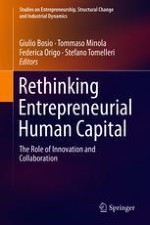This book focuses on the specific traits and nature of entrepreneurial human capital and the extent to which it can be stimulated by entrepreneurship education – especially when these activities combine collaborative practices and innovation. It includes a comprehensive collection of articles on how entrepreneurship education can be structured, providing theoretical reflections as well as empirical evidence. As such it contributes to the ongoing debate on the teachability of entrepreneurial skills and the role of innovation and collaboration in the design of educational programs that aim to spread entrepreneurial human capital.
